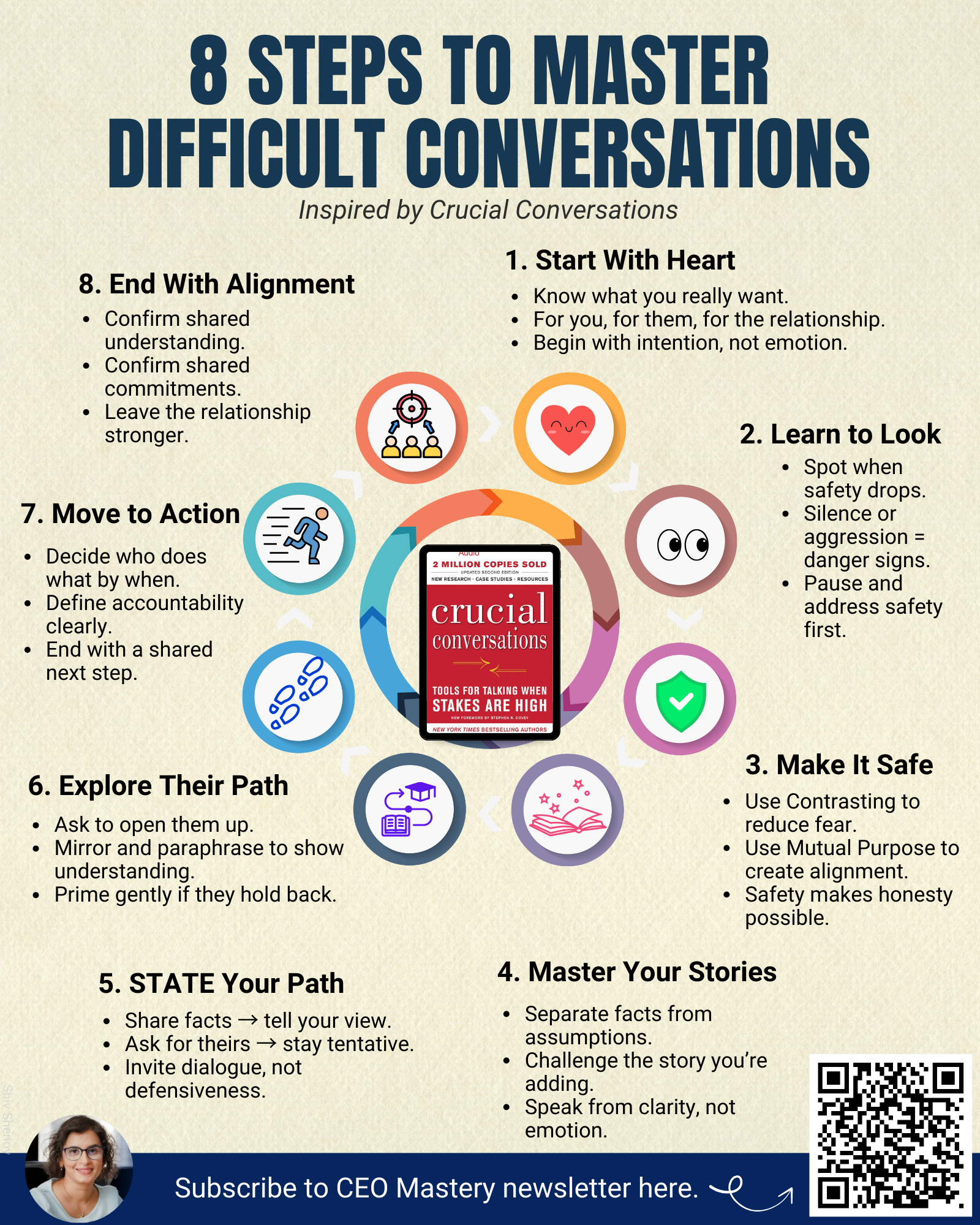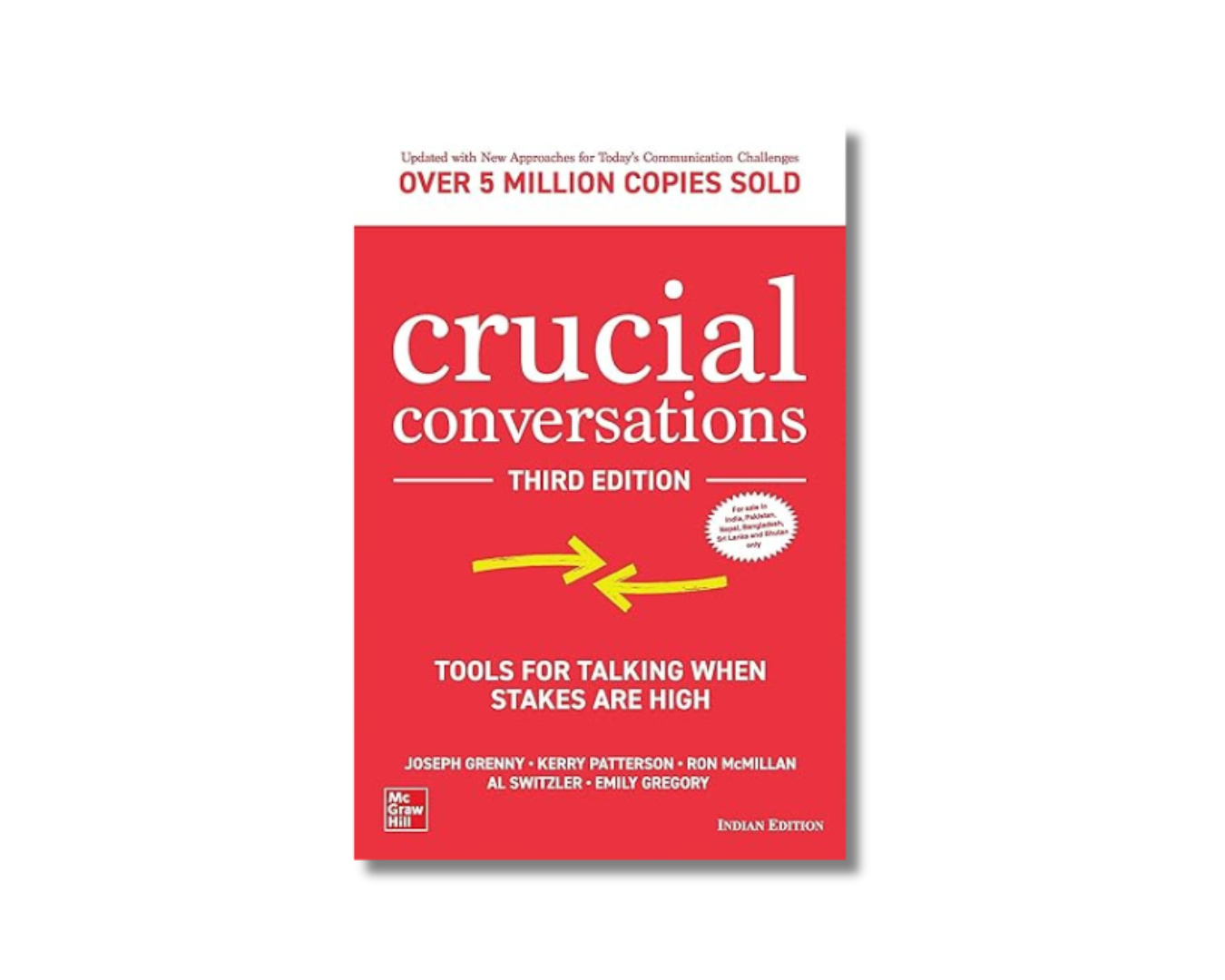I was once sitting in a board meeting, watching two leaders avoid looking at each other.
One was frustrated. One was defensive.
Both were pretending everything was “fine.”
We were discussing a missed deadline.But the real issue wasn’t the deadline. It was the dozen conversations they never had leading up to it.
I asked a simple question: “When did you two last talk honestly about this?”
They looked at me, then at each other. Neither had the answer.
That’s when it clicked for me: Companies don’t break because of one big event. They break because people don’t know how to communicate under pressure.
And that’s the core of Crucial Conversations — the ability to stay clear, calm, and constructive when the stakes are high, emotions are rising, and silence feels safer.
Founders face these moments daily. Ignoring them doesn’t buy peace. It buys future chaos.
The Founder’s Pressure Cooker
Every founder knows the feeling: A conversation needs to happen. You know it. They know it. But the room feels heavier.
Deadlines.
Ego.
History.
Power dynamics.
Fear of being misunderstood.
This is the pressure cooker where most communication fails.
Crucial Conversations teaches that the goal is not to communicate perfectly. It’s to communicate safely, even when emotions spike. Because once safety is broken, truth disappears. People protect themselves. Honesty gets filtered. Problems grow quietly.
And execution slows in ways founders never see coming.
What Makes a Conversation “Crucial”?
The book defines three ingredients:
- High stakes
Performance, partnership, or revenue is on the line. - Strong emotions
Someone is upset, disappointed, or checked out. - Opposing opinions
Two people see the same situation differently.
Founders face these conversations more often than any other role in the company.
Hiring.
Firing.
Co-founder alignment.
Scope creep.
Accountability.
Compensation.
Prioritization.
Crucial conversations are not rare. They are leadership.
The Skill Founders Need: Create Safety First
When stakes rise, the brain goes into self-protection. Logic shrinks. Emotion grows.
The book’s core lesson is simple: People will not hear you until they feel safe.
Safety does not mean comfort. Safety means respect + clarity of intent.
Here’s what founders can do:
- Start by affirming shared goals
- Make your intent explicitly non-threatening
- Show that this conversation is about improvement, not judgment
- Give space for their version of the story
- Slow down your pace so they can stay regulated
Once safety is restored, logic returns. Collaboration becomes possible again.
How to Communicate Under Pressure (The Founder Playbook)
1. Say the thing driving the silence
Founders often talk around issues. Name the real tension early. It reduces defensiveness.
2. Focus on facts, not stories
Stick to observable behavior. Avoid assumptions, guesses, or emotional interpretations.
3. Lead with curiosity, not certainty
Ask questions before giving conclusions. People open up when they feel heard.
4. Hold your emotion, not theirs
Your calm sets the tone. If you escalate, they shut down.
5. Create agreements, not vague understandings
Define:
What changes?
Who owns it?
By when?
How will we know?
6. Follow up consistently
A crucial conversation without follow-through is just a stressful chat.
Why This Matters So Much for Founders
As companies scale, the cost of poor communication multiplies.
- Key hires walk away without warning
- Execution slows without obvious cause
- Co-founder relationships strain
- Teams guess instead of align
- Good people burn out silently
- Problems surface too late
Most of these are not product problems. They’re communication problems under pressure.
Crucial Conversations gives founders a path to handle these moments before they turn into structural failures.

Final Thought
Every founder eventually learns this: Success is not decided by how you talk when things are easy. It is decided by how you talk when everything is hard.
Silence is not safety. Softness is not kindness. Conflict is not failure.
The ability to stay calm, clear, and constructive under pressure is one of the most important operational skills a founder can build.
And reading Crucial Conversations is an excellent place to start.

